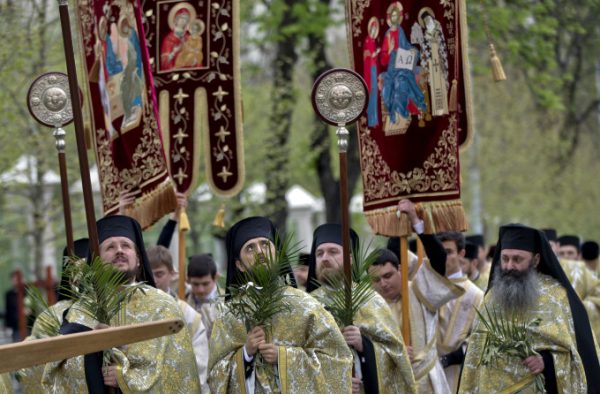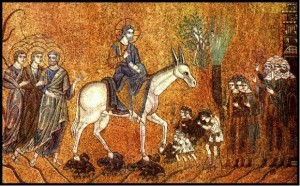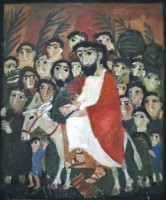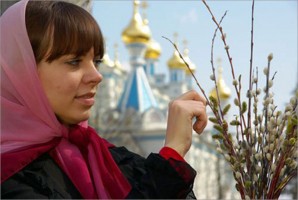As Christ triumphantly, and yet so humbly, entered Jerusalem, the children and those of ‘child-like’ faith laid down palms and garments, crying out, “Hosanna! Blessed is He who comes in the name of the Lord!” Others and those without faith, not believing the prophets, saw in Jesus only a political figure, an enemy to their man-made religion, attributing to him their own desires and fears. Many thought that Jesus was going to inaugurate a new dynasty of the Kings of Israel, a temporal kingdom, helping them overthrow those usurping Romans!
In our own day, this practice of making Jesus into what we want Him to be continues: Many read into the Gospel their own interpretations, others try to ‘modernize’ the Gospel, to make it what they consider to be more ‘relevant,’ what suits them–or the culture—as opposed to what God has revealed to us of Himself. The Gospel is interpreted to apply to particular socio-political problems. Others take only what they want from the Christian past, disregarding the rest of the rich, well-documented historical record of faith passed down through the ages.
The person of Christ defies those who would “re-imagine” Him. His own words, actions, and miracles, and the changed lives of the Saints, prevent us from viewing Him as simply a prophet or great teacher. By raising Lazarus from the dead (after four days!), Christ demonstrates His power over death as the Giver of life. He reveals His glory as God. For this reason, the Jewish leaders seek to kill him from this point on. Only God can forgive sins and give life: Christ gives life and forgives sins; they condemn Him, they desire to kill Him.
Christ came to inaugurate a new kind of kingdom, a new spiritual and eternal kingdom, fit for the new spiritual race of man that He became incarnate and suffered death to grant us. Christ is our peace. Christ is our life. Christ offers us friendship with God. He is our reconciliation. Man will never achieve peace or unity or a lasting kingdom apart from Christ God, the Prince of Peace, the One who alone gives mankind an identity grounded not in this world, which is passing away, but in His eternal Kingdom, grounded in the Truth, which is everlasting.
The only true reconciliation, the only means of uniting us to one another, is through true communion with Christ God, ongoing, growing participation in the life of God the Holy Trinity. This restoration to new life in Him, by “water and the spirit,” means increased freedom from enslavement to the passions and all the vain, humanistic attempts to save ourselves (or the world). Any human attempts to obscure the Gospel or make it more ‘palatable’ to modern sensibilities (as if we knew better) will always fail because it’s not the truth God has revealed, the Truth He is, the truth in which you and I are created and called to become the children of God that He suffered, died, was buried and resurrected to make us.
Upon His entry into Jerusalem, Jesus launches no revolt against the Roman authorities; He doesn’t try to take Herod’s throne. Instead, throughout His earthly ministry, He does the following, indicative of the new kind of Kingdom He inaugurates: He gives sight to the blind, multiplies the loaves and fishes, makes the lame to walk, heals the lepers, and casts out demons. He forgives the sins of those who come to Him in faith and, He raises Lazarus from the dead. For all these acts of mercy and messianic fulfillment, the Jewish authorities are indignant. Those who reject Him don’t want a new spiritual kingdom; they’re looking for a ‘military Messiah.’ Instead, Jesus comes riding into Jerusalem, humbly, on the foal of an ass.
Those awaiting the Messiah with their child-like faith, depicted by the children in the icon of the Feast, saw Christ’s miracles and they, with open hearts, glorified God for this revelation of Christ’s true divine glory. But those who rejected Christ out of fear and pride, saw the same miracles and sought to put Christ to death—and (imagine!) even Lazarus too after he was raised from the dead, viewing his testimony as a threat to their man-made religion. The prophet Zechariah saw this coming. As we heard at Vigil for the Feast, he admonishes Israel, saying, “Do not fear, O daughter of Zion; behold thy King cometh unto thee: he is just and having salvation…lowly and riding upon an ass, and upon a colt, the foul of an ass.” (Zech. 9:9) Even the disciples, we read, did not understand this truth until after His resurrection.
St. Gregory Palamas writes, “Your king… does not arouse fear in those who see Him. Nor is He an oppressor or evildoer accompanied by shield-bearers and spearmen… His banner is humility, poverty, and lowliness.” (Veniamin, St. Gregory Palamas: the Homilies)
The message of Palm Sunday, of Christ’s Triumphal entry, is this truth: Christ is the Messiah, the Holy One, the King of Israel, God incarnate. He has entered into human nature as man and redeemed it as God. He has come to Jerusalem to accomplish the final life-saving acts of that redemption that will lead Him and us to the cross, the grave, and the glorious resurrection on the third day. He has come to make us whole, humble, truth-loving, children of God.
This is radical—the notion that God is humble, that He would love us to such an extent that He would become incarnate, one of His own creation, while remaining God and then suffer death and burial and raise Himself from the dead, is absolutely radical: “a stumbling block to the Jews and foolishness to the Gentiles.” Christ God demonstrates this humility, this love, this power in the enemies He vanquishes—Satan and his demons, sin and death in us.
By means of repentance and obedience to Christ and the Church, we learn, step by step, to give up those vestiges of our former life, having it our way, giving into our passions, our desire to have the Gospel on our prideful and selfish terms. Instead, we follow our Lord, God, and Savior to His holy and life-giving Passion. We too take up our cross in courageous humility and self-denial, the mantel of what it means to be an Orthodox Christian—to be in the world but not of the world, to love as Christ and die to self. We live as inheritors and progenitors of the Faith once received and in continuity with all God’s promises fulfilled.
We do so today through repentance, by readying ourselves for salvation. We do so by participating this week in the holy services, taking their lessons to heart, and journeying with Christ, as if this were the last week we have to live and so be changed: we prioritize our life with God, our life and the life of the world. We apply the truth of the revealed Gospel to our lives so that we may celebrate Holy Pascha in faith and love, advanced in our identity in Christ, so that with Christ, we too may be raised from death with Him, our King and our God.
I encourage you: make Christ your priority this Holy Week. Receive Him as He comes to us this Holy Week by the Holy Spirit, softly, humbly, but powerfully. If you do so, this week will be a time of renewal, of healing, and growth in your life, uniting you further with Him who is Life, the vanquisher of sin and death. No one who asks this of God and priorities the services given to us by Christ this week will go away empty. In this way, Christ’s victory over sin and death will be accomplished in us too. To that end, we pray for that child-like faith of the children with the palms of victory, who cry out to Him on this day, “O Vanquisher of Death: Hosanna in the highest! Blessed is he that comes in the name of the Lord!”




















